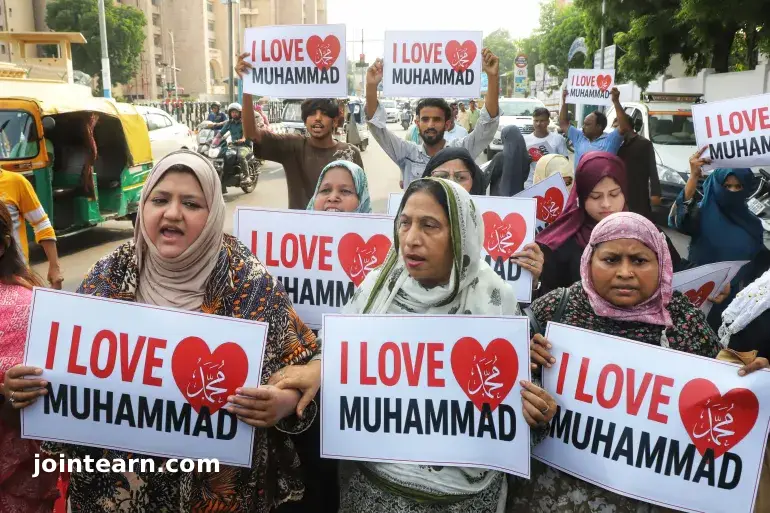
Lucknow, India — October 21, 2025 — Outrage is growing among India’s Muslim community after authorities in several Bharatiya Janata Party (BJP)-ruled states filed criminal cases against hundreds of Muslims for publicly expressing love for the Prophet Muhammad. The campaign, centered around the slogan “I love Muhammad”, has led to arrests, demolitions, and accusations of communal bias by India’s ruling party.
The controversy began in Kanpur, a city in the northern state of Uttar Pradesh, when residents of the Muslim-majority Syed Nagar neighborhood displayed an illuminated sign reading “I ❤️ Muhammad” during celebrations for Eid Milad-un-Nabi, marking the Prophet’s birthday. Local Hindu groups objected, claiming the sign was placed on ground they traditionally used for Hindu festivals. Police intervened and filed charges against nine Muslims, accusing them of promoting enmity and hurting religious sentiments.
Residents insist the decoration was placed in a public area used every year for religious events.
“We had official permission for the decorations. Everyone has the right to practice their religion,” said one of the accused, speaking anonymously out of fear of retaliation.
Widening Crackdown Across Uttar Pradesh
Just days later, similar tensions erupted in Bareilly, a major religious center for the Barelvi sect of Sunni Islam. Police there filed an FIR (First Information Report) against nine Muslims, including prominent cleric Maulana Tauqeer Raza Khan, alleging they had “disturbed communal harmony” by starting a new “tradition” linked to the “I love Muhammad” slogan.
Defying an official ban on protests, thousands of Muslims gathered in Bareilly on September 26 carrying placards with the same message and chanting religious slogans. Police accused some demonstrators of stone-pelting, prompting a violent crackdown that included baton charges, mass arrests, and an internet shutdown across the city.
Khan, later arrested, denounced the police action in a video message, calling it a “targeted suppression of religious expression.” He warned, “Attempts to suppress our sentiments will backfire.”
Following the unrest, Chief Minister Yogi Adityanath — a Hindu monk and senior BJP leader — characterized the protests as a “well-orchestrated attempt” to disturb peace. His comments, referring to Muslims as needing “denting and painting,” drew widespread criticism for dehumanizing language and anti-Muslim undertones.
Bulldozers and “Extrajudicial Punishment”
In keeping with a pattern seen across BJP-governed states, authorities in Bareilly demolished properties linked to Muslim protesters shortly after the clashes. Among the structures razed was a banquet hall owned by one of the accused. Officials claimed the demolitions targeted illegal construction, but rights groups say they represent collective punishment and “bulldozer justice” — an extrajudicial method condemned by India’s Supreme Court.
“Police are registering cases to suppress legitimate protest,” said activist Sumaiya Rana, who organized a solidarity rally in Lucknow. “The government wants to instill fear so Muslims lose the courage to express their faith.”
The Association for Protection of Civil Rights (APCR) reports at least 22 FIRs filed nationwide, implicating over 2,500 people and resulting in dozens of arrests. APCR Secretary Nadeem Khan called the charges “a blatant misuse of power,” adding, “Authorities have treated a peaceful expression of love for the Prophet as a criminal act.”
Voices of Resistance and Solidarity
Prominent Muslim organizations and civil rights advocates have condemned the crackdown as unconstitutional.
SQR Ilyasi, a member of the All India Muslim Personal Law Board, asserted:
“Expressing love for the Prophet is our right. Peaceful protest is not a crime.”
Activist Vandana Mishra of the People’s Union for Civil Liberties noted the double standard in India’s treatment of religious expression:
“Hindus can chant slogans freely, while Muslims face arrest for similar actions. This violates the secular principles of our constitution.”
Opposition leaders from the Samajwadi Party accused the Uttar Pradesh government of authoritarian behavior after their delegation to Bareilly was blocked. “The government talks about democracy but practices dictatorship,” said opposition leader Mata Prasad Pandey.
The Human Cost of Hate Politics
Lawyers representing the accused say most of those charged are daily wage workers or small traders, unable to afford lengthy legal battles.
“This kind of hate politics preys on the poor,” said Zia Jillani, a Bareilly-based advocate. “It exploits their vulnerability while denying them justice.”
Despite mounting international criticism and domestic protests, the Uttar Pradesh government shows no signs of reversing course. For many Indian Muslims, the “I love Muhammad” cases are not just about faith — they symbolize a deeper struggle against religious discrimination, police impunity, and the shrinking space for dissent under the BJP’s rule.


Leave a Reply